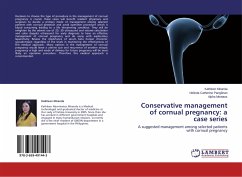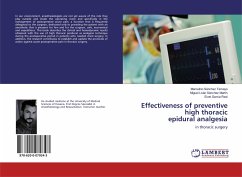
High Risk Pregnancy: The Role of Plasmapheresis During Pregnancy
Comprehensive Multidisciplinary Management
Versandkostenfrei!
Versandfertig in 6-10 Tagen
27,99 €
inkl. MwSt.

PAYBACK Punkte
14 °P sammeln!
The term High-Risk Pregnancy includes a group of women that have a greater chance of pregnancy complications due to a preexisting health conditions or due to the occurrence of a specific disease related to pregnancy. Although some of these conditions are common others have a low prevalence and the management raises a number of concerns to health care providers. In these pages we will review some of those conditions, focusing on the diseases that might be treated with plasmapheresisIt is well known the important role of plasmapheresis in the removal of the F-VIII multimers observed in the throm...
The term High-Risk Pregnancy includes a group of women that have a greater chance of pregnancy complications due to a preexisting health conditions or due to the occurrence of a specific disease related to pregnancy. Although some of these conditions are common others have a low prevalence and the management raises a number of concerns to health care providers. In these pages we will review some of those conditions, focusing on the diseases that might be treated with plasmapheresisIt is well known the important role of plasmapheresis in the removal of the F-VIII multimers observed in the thrombotic thrombocytopenic purpura, but also the auto-antibodies that appear in Myasthenia Gravis, Antiphospholipid Syndrome or Systemic Lupus Erythematosus. There are also some situations where plasma exchange therapy is being used recently with success like Isoinmunization, Gestational Penphigoid, Prymary Hypertriglyceridemia or Acute gravidic liver steatosis. Throughout this chapter we reviewthe most important clinical and therapeutic features of these illness during pregnancy.












